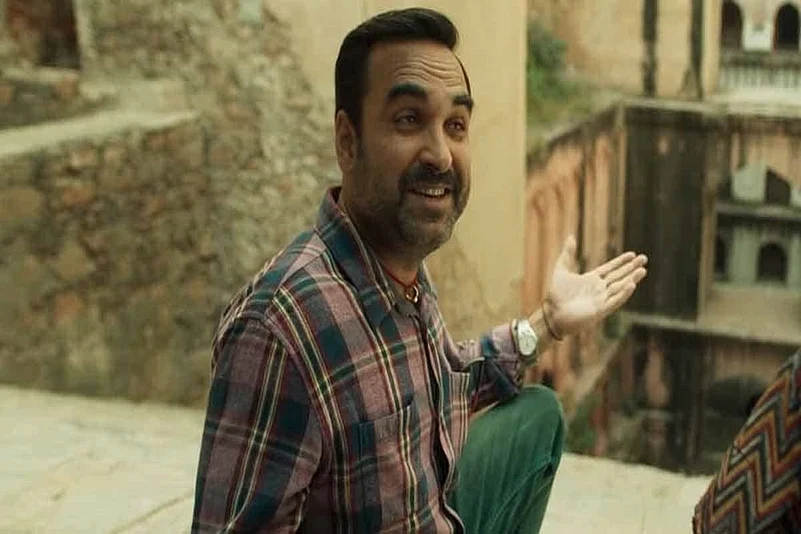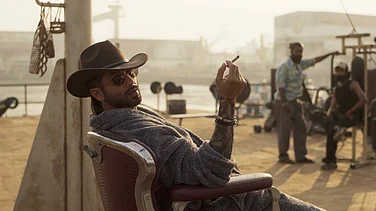If there is one thing that’s expected from Pankaj Tripathi – it is the unexpected he delivers every time he is on the screen. Known to experiment with different roles and genres, the actor has gathered quite a fan following for his work in movies such as ‘Masaan’, ‘Gangs of Wasseypur’, ‘Mirzapur’, among others. In ‘Mimi’, which released on Netflix on July 26, he is playing a man who helps an American couple find a surrogate for their baby. The high-on-emotion drama also stars Kriti Sanon in the titular role.
The 44-year-old, in an interview with Outlook’s Eshita Bhargava, talks about how he has managed to explore a little more of himself through ‘Mimi’, his first day in Mumbai, his favourite scene in the film, and much more. Excerpts from a conversation.
Tell us something about your character Bhanu. What made you say yes to it.
It’s an interesting and fun character. It’s not a black and white character. Bhanu has a sense of humour, is clever, and has a survival instinct. At first, you would think that he is greedy, but eventually, you will see his emotional side. Bhanu has his journey. It was an experience working with Laxman Utekar and the script was so good that I had to say yes.
What was the most difficult scene in the film?
There’s are many emotional scenes in the film and those were difficult for me. The audience would see a new side as I have come out of my comfort zone for ‘Mimi’.
How do you look at this whole idea of making sure that your characters or projects are gender-sensitive considering most of your work is regarded as relatable and real?
I ensure that the films I am associating myself with are gender-sensitive and the women characters are shown in a better light. That’s a conscious decision. ‘Mimi’ is a story about a girl who makes choices in life to achieve her dreams – We have been really careful in portraying her. From writing to execution, the film at no point stereotypically looks at Mimi, but in a sensitive way. It’s not easy to make a film that is both sensitive and entertaining. The message of the film is so beautiful.
Any behind-the-scenes incidents that you would want to share?
There’s a scene where I am pretending to be a Muslim man to keep Mimi (played by Kriti Sanon) company as she becomes a surrogate mother. The maulana asks me how many times do I offer namaz during a day. To which, I instantly reply, "10 martaba." When the maulana tells me namaz is to be offered only five times a day, I manage the situation by saying I answered for two days, and not one.
What happened was that we didn't rehearse it, so the unit didn't know what the scene will be like. We rehearsed it on the terrace and asked Laxman sir that we have to do this scene. We told him we've planned something and we want to do it. He has faith in me and asked me to perform it. Aur hum dono ne jo drama shuru kara, maine aur Gyaan bhai ne. NSD ka experience kaam aaya yaha pe. Ab sound film hai, aadhi unit mooh band karke hass rahi hai... Camera wale ka tripod pe hath hil raha hai. (I and Gyan started our drama and our NSD experience came in handy. It’s a sing sound film and the unit was not able to contain their laughter after watching the scene). It was hilarious.
How did you think of getting into acting?
On October 16, 2004, at 7 am – I reached Mumbai. I can never forget it. Coming to Mumbai, falling in love, getting married – these are a few special moments and I can never forget these.
Any person who wants to become an actor and comes to Mumbai has a deeper process – it’s not easy and involves a lot of struggle, money, passion, dedication, and courage. It’s never just about coming to the city of dreams. Mumbai aane k liye paiso se zaada sahas ki zaroorat hoti hai. (More than money, you need courage). The courage I came with, I continued with that. It helped to keep me encouraged and grounded. Sahas ne kabhi let down feel ni hone dia (Courage never let you down). I was an introvert and speak very few words. Theatre was mean to communicate and express my feelings. This is how I started.
How important is playing a lead for you?
It is important to play a good character. But, to be honest, every actor has a dream to play the lead in the films. I am working for a better future and the lead is also a character but he is the protagonist. Even I want it and I have no qualms in accepting it. In my eyes, from the day I stepped into Mumbai, I have tried to just give my best. However, the kind of hard work, sincerity, and passion I put in is the same for a small role as well as a lead role.
From playing a fun character to that of a gangster, you’ve done it all. How do you balance between positive and grey roles?
That’s my job! The training I got at NSD has prepared me for it. There are times when I am shooting for two opposite films. I am shooting for a comedy film for three days and another three days I am doing serious film… but that’s the craft, an experience that you learn with time. There are writers, directors for help. Acting is not an easy job, it takes a lot. If you are overly involved with the character and if you are trying to understand his psychology, you tend to get affected. This happened while I was shooting for ‘Gurgaon’ but I know how to detach myself from the character soon after the film/series is over.
Do you think OTT has changed the game?
Yes. There’s no scene of opening day or making 100 crores on the first weekend. It all depends on the story and how the film is. The reach has increased. The film is now available to people in remote areas as well.
And your take on OTT censorship?
The storytellers should have the liberty to show what they want to, but at the same time, it’s important to be responsible. The aim of showing something should be either to educate or if the scene is relevant to complete the film. The intention should be right. Censorship might stop some good stories from coming out.
What’s next?
'83', [then] there’s an Amazon Show, 'Criminal Justice', 'Bachchan Pandey'… I am all occupied for a year. All thanks to the audience.





















.jpg?w=200&auto=format%2Ccompress&fit=max)




